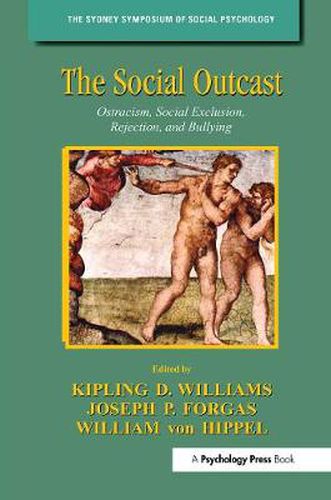Readings Newsletter
Become a Readings Member to make your shopping experience even easier.
Sign in or sign up for free!
You’re not far away from qualifying for FREE standard shipping within Australia
You’ve qualified for FREE standard shipping within Australia
The cart is loading…






This book focuses on the ubiquitous and powerful effects of ostracism, social exclusion, rejection, and bullying. Human beings are an intrinsically gregarious species. Most of our evolutionary success is no doubt due to our highly developed ability to cooperate and interact with each other. It is thus not surprising that instances of interpersonal rejection and social exclusion would have an enormously detrimental impact on the individual. Until 10 years ago, however, social psychology regarded ostracism, rejection, and social exclusion as merely outcomes to be avoided, but very little was known about their antecedents and consequences, and about the processes involved when they occurred. Understanding how people relate to each other, why they choose to exclude others, and how and why individuals and groups respond as they do to acts of rejection and exclusion has never been of greater importance than today. Acts of exclusion have been linked to depression, alienation, suicide, and mass killings. Marginalization leads people to seek stronger bonds with fringe elements, thus creating more opportunities for anti-social behaviors. The main objective of this book is to explore the powerful consequences of being socially outcast at the neurophysiological, emotional, cognitive, and behavioral levels. The contributors offer integrative theories that encapsulate the experience of ostracism, exclusion, and rejection. Several chapters explore the role of individual differences in how people respond to exclusion, and the role of social exclusion in triggering adaptive, pro-social or dysfunctional, anti-social behaviors is discussed. The book is written in a readable yet scholarly style, and researchers, practitioners, and students at both the undergraduate and graduate level should find it an engaging overview of the field. It can be used as a core textbook in advanced undergraduate and graduate courses dealing with social exclusion, and should be of particular interest to practitioners and researchers in applied areas such as clinical, counseling, health, and organizational psychology where the real-life antecedents and consequences of social exclusion are of vital interest.
$9.00 standard shipping within Australia
FREE standard shipping within Australia for orders over $100.00
Express & International shipping calculated at checkout
This book focuses on the ubiquitous and powerful effects of ostracism, social exclusion, rejection, and bullying. Human beings are an intrinsically gregarious species. Most of our evolutionary success is no doubt due to our highly developed ability to cooperate and interact with each other. It is thus not surprising that instances of interpersonal rejection and social exclusion would have an enormously detrimental impact on the individual. Until 10 years ago, however, social psychology regarded ostracism, rejection, and social exclusion as merely outcomes to be avoided, but very little was known about their antecedents and consequences, and about the processes involved when they occurred. Understanding how people relate to each other, why they choose to exclude others, and how and why individuals and groups respond as they do to acts of rejection and exclusion has never been of greater importance than today. Acts of exclusion have been linked to depression, alienation, suicide, and mass killings. Marginalization leads people to seek stronger bonds with fringe elements, thus creating more opportunities for anti-social behaviors. The main objective of this book is to explore the powerful consequences of being socially outcast at the neurophysiological, emotional, cognitive, and behavioral levels. The contributors offer integrative theories that encapsulate the experience of ostracism, exclusion, and rejection. Several chapters explore the role of individual differences in how people respond to exclusion, and the role of social exclusion in triggering adaptive, pro-social or dysfunctional, anti-social behaviors is discussed. The book is written in a readable yet scholarly style, and researchers, practitioners, and students at both the undergraduate and graduate level should find it an engaging overview of the field. It can be used as a core textbook in advanced undergraduate and graduate courses dealing with social exclusion, and should be of particular interest to practitioners and researchers in applied areas such as clinical, counseling, health, and organizational psychology where the real-life antecedents and consequences of social exclusion are of vital interest.